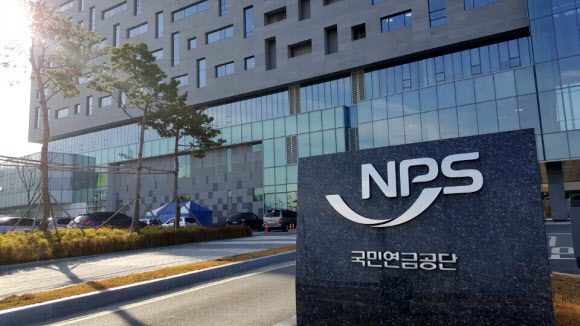Moon’s shareholder engagement push to empower pension funds
By Son Ji-hyoungPublished : Jan. 7, 2020 - 15:52
South Korean President Moon Jae-in on Tuesday called for the swift revision of laws to allow institutional investors to ramp up shareholder engagement in the domestic market. This, he stressed, would prevent abuses of power in the business world.
In his New Year’s speech, Moon urged the government to amend the Capital Markets Act and the Commercial Act, saying the proposed changes were critical to ensure fairness in the domestic market.
“Fairness is the backbone of innovation and inclusivity to bring fresh vitality to Korea’s economy and society,” Moon said. “(Korea) will continue to go all out to revise laws to better implement the stewardship code (of institutional investors) and achieve fairness in the national economy.”
In his New Year’s speech, Moon urged the government to amend the Capital Markets Act and the Commercial Act, saying the proposed changes were critical to ensure fairness in the domestic market.
“Fairness is the backbone of innovation and inclusivity to bring fresh vitality to Korea’s economy and society,” Moon said. “(Korea) will continue to go all out to revise laws to better implement the stewardship code (of institutional investors) and achieve fairness in the national economy.”

Proposed in September by the Financial Services Commission, a top financial policymaker and regulator in Korea, the changes to the Capital Markets Act would offer greater leeway for Korea’s institutional investors when disclosing the purchase or sale of stakes in companies listed on the Korea Exchange, if the shareholder has voting rights of at least 5 percent.
Also, pension funds would not be obliged to return short-term yields -- that is, within six months after the investment -- to companies in which they hold at least 10 percent voting rights.
Once the changes are in place, over 100 institutional investors’ “stewardship codes” -- internal statements outlining their investing principles -- can be expected to come full circle, preventing potential market disruption due to the need for frequent disclosures.
Under the current law, institutional investors were obliged to submit regulatory filings within five trading days of carrying out any shareholder engagement -- actions ranging from hiring or firing an executive to proposing a merger or changing the company’s articles of association, dividend policies or executive salaries.
But under the looser standards, those institutional investors would only have to issue abridged disclosures within five trading days, and only if they proposed board reshuffles or mergers. Proposals dealing with dividends or payrolls would be subject to monthly disclosures.
Korea is home to dozens of institutional investors, including pension funds such as the National Pension Service, the Teachers’ Pension and the Government Employees Pension Service, as well as mutual aid associations, which have exposure to Korean equities.
Meanwhile, the Ministry of Justice since 2018 has sought to revise the Commercial Act to empower shareholders to exercise greater rights through such actions as shareholder derivative lawsuits and cumulative voting. In shareholder derivative lawsuits, shareholders can sue the company management on behalf of other shareholders, whereas cumulative voting ensures that minority shareholders are better represented when electing board members. The bills are currently pending in the National Assembly.
Moon’s pledge in his speech to achieve “fairness in the domestic market” went beyond the role of institutional investors.
He stressed the government’s determination to tame soaring housing prices, saying the nation was “waging a war against speculation in the domestic housing market.” In 2019 alone, related regulations took effect in August, September and December.
By Son Ji-hyoung (consnow@heraldcorp.com)
Also, pension funds would not be obliged to return short-term yields -- that is, within six months after the investment -- to companies in which they hold at least 10 percent voting rights.
Once the changes are in place, over 100 institutional investors’ “stewardship codes” -- internal statements outlining their investing principles -- can be expected to come full circle, preventing potential market disruption due to the need for frequent disclosures.
Under the current law, institutional investors were obliged to submit regulatory filings within five trading days of carrying out any shareholder engagement -- actions ranging from hiring or firing an executive to proposing a merger or changing the company’s articles of association, dividend policies or executive salaries.
But under the looser standards, those institutional investors would only have to issue abridged disclosures within five trading days, and only if they proposed board reshuffles or mergers. Proposals dealing with dividends or payrolls would be subject to monthly disclosures.
Korea is home to dozens of institutional investors, including pension funds such as the National Pension Service, the Teachers’ Pension and the Government Employees Pension Service, as well as mutual aid associations, which have exposure to Korean equities.
Meanwhile, the Ministry of Justice since 2018 has sought to revise the Commercial Act to empower shareholders to exercise greater rights through such actions as shareholder derivative lawsuits and cumulative voting. In shareholder derivative lawsuits, shareholders can sue the company management on behalf of other shareholders, whereas cumulative voting ensures that minority shareholders are better represented when electing board members. The bills are currently pending in the National Assembly.
Moon’s pledge in his speech to achieve “fairness in the domestic market” went beyond the role of institutional investors.
He stressed the government’s determination to tame soaring housing prices, saying the nation was “waging a war against speculation in the domestic housing market.” In 2019 alone, related regulations took effect in August, September and December.
By Son Ji-hyoung (consnow@heraldcorp.com)






![[From the Scene] Monks, Buddhists hail return of remains of Buddhas](http://res.heraldm.com/phpwas/restmb_idxmake.php?idx=644&simg=/content/image/2024/04/19/20240419050617_0.jpg&u=20240419175937)





![[Graphic News] French bulldog most popular breed in US, Maltese most popular in Korea](http://res.heraldm.com/phpwas/restmb_idxmake.php?idx=644&simg=/content/image/2024/04/18/20240418050864_0.gif&u=)



![[From the Scene] Monks, Buddhists hail return of remains of Buddhas](http://res.heraldm.com/phpwas/restmb_idxmake.php?idx=652&simg=/content/image/2024/04/19/20240419050617_0.jpg&u=20240419175937)

![[KH Explains] Hyundai's full hybrid edge to pay off amid slow transition to pure EVs](http://res.heraldm.com/phpwas/restmb_idxmake.php?idx=652&simg=/content/image/2024/04/18/20240418050645_0.jpg&u=20240419100350)

![[Today’s K-pop] Illit drops debut single remix](http://res.heraldm.com/phpwas/restmb_idxmake.php?idx=642&simg=/content/image/2024/04/19/20240419050612_0.jpg&u=)